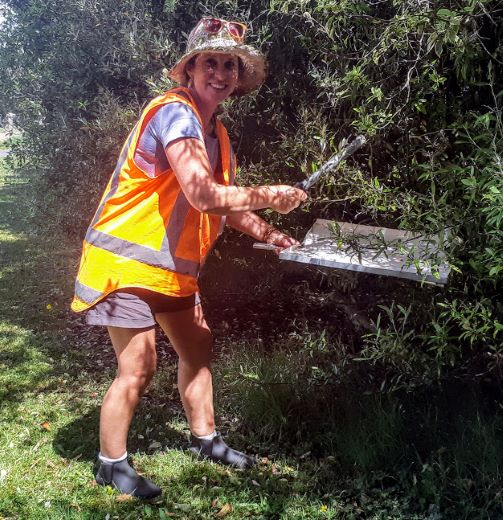Ngatimoti Primary School - Lauren Milnes

2021 | Delving into deadly diseases in the world of orchard fruit
School: Ngatimoti Primary School
Hosts: Plant and Food Research Motueka – Rangahau Ahumara Kai
Ngatimoti School is in a rural area. The Green-gold Enviro School has access to many natural resources such as the Motueka River, wetlands, streams, White Rock and National Parks. As well, there are a number of farms including blueberry, apple, and nashi pear orchards, hop farms and vineyards close by. It’s a school of around 100 students, therefore the four teachers need to wear many hats! Ngatimoti School enjoys environmental learning and science as a vital component of our curriculum. It is timetabled, and it takes as many opportunities as possible to teach science in fun, meaningful ways. This includes inviting scientists in, field trips and experiencing science in action out in the primary sector, (especially as a part of its careers programme).
Lauren has been teaching for the past twenty two years in rural and urban primary schools. She has had the opportunity to teach over a wide range of cultural and socio-economic backgrounds, ages, levels, subjects and abilities. She is the deputy principal at her current primary school and is passionate about environmental education, math, art and science.
Lauren has been hosted at Plant and Food Research Riwaka. Her placement involved spending time in the pathology, entomology, molecular biology and pear breeding labs, out in both PFR glasshouses and orchards, as well as off-site on local orchards, visiting other Plant and Food research facilities around New Zealand, attending weekly team meetings, research student and breeding conferences. This has provided Lauren with a more in depth knowledge of the nature of science especially how it applies practically in scientific, environamental and economic terms, as well as some associated laboratory and field skills. The placement also highlighted for Lauren the importance of relationships; the sharing of knowledge, skills, the support and critiquing that underpins robust scientific research.
A highlight for Lauren was working with the pathology and pear teams on a collaboration project in investigating bacterial infection in seeds of a high-value pear variety. She participated in the scientific process of trial and error, of close observation and recording of data, critiquing and learning the skills needed in order to do this. The results of this project have become more significant to the teams involved than originally predicted and a research assistant was employed full-time to continue the work.
Lauren has also helped lead a collaborative project between her school, Plant and Food, Project Janszoon/DOC, local iwi and another local school, Brooklyn. A disused insect house at Plant and Food was to be torn down. Lauren was working with the entomology team at the time and together they decided to turn it into a butterfly breeding house, after reading research about the rapidly declining population of butterflies around the world, particularly in our area. The goal is to rear and release native and endemic butterflies, starting with the Monarch to get the system up and running, then carrying out an inventory of local endemic species, choosing one to breed, before moving onto breeding local endangered species like the Forest Ringlet. Students from Ngatimoti School will come out fortnitely to maintain and study the butterflies, working alongside the entomology team and other interested PFR staff.
The Science Teaching Leadership Programme has provided Lauren with an extraordinary professional learning journey. She is now looking forward to applying this learning to Ngatimoti School. She would like to thank The Royal Society, her host Robert Schaffer and the pathology, pear breeding and entomology departments at Plant and Food Riwaka and Ngatimoti School for investing in her.
